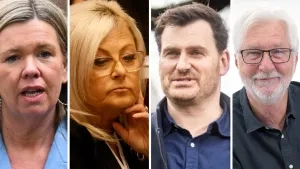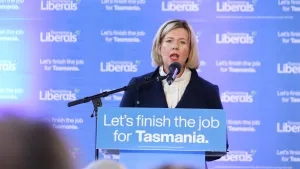The most likely outcome of Tasmanias election this Saturday is another minority government. The latest seat estimate from election analyst Kevin Bonham gives the major parties a 10-seat crossbench to negotiate with, most expected to be held by the Greens.
Premier Jeremy Rockliff says the Liberals will not seek the Greens support to form government support that wasnt really on offer. And while Greens leader Rosalie Woodruff has proposed (at several points along this insane snap election journey) to work with Labor to form government, Labor leader Dean Winter has stuck to the boring slogan that he wont do a deal with the Greens. However, he suggested on Wednesday that a supply-and-confidence arrangement might be okay.
Regardless of which major party leads, voters will be telling these representatives: please work it out. Whatever approach was taken over the past 15 months isnt the way forward.
Related Article Block Placeholder Article ID: 1210990

So, how does a productive minority government or what The Australia Institute is rebranding as a power-sharing government work in practice?
The progressive think tank held a panel on this topic at Hobart Town Hall last week, featuring former Greens leader Christine Milne, whose alliance with the Liberals in the 1996 state parliament achieved significant reform, and former premier David Bartlett, who negotiated the 2010 Labor-Greens minority government.
They spoke about the obvious soft stuff: building trust, mutual respect. Milne said Tony Abbott could never be trusted to honour what hed agreed to. Bartlett could not have been more complimentary of then Tasmania Greens leader Nick McKim, with whom he struck the minority government deal that included a ministry position for McKim and a cabinet secretary position for the Greens Cassy OConnor.
More interesting was the discussion of the hard structures and procedures necessary to support cross-party collaboration.
Bartlett said he believed the protocols he and McKim agreed to in a series of letters made it possible to share power: McKim and OConnor would share the Greens perspective in cabinet meetings but must ultimately vote with Labor. On issues of irreconcilable difference, the two could absent themselves from the cabinet discussions and vote with their own party.
We had to work hard at solving problems, as our number-one job was to keep the two Greens in the cabinet for all decisions, Bartlett said. It gave both sides a formal process to resolve disagreements without exploding the government.
Related Article Block Placeholder Article ID: 1214251

Milne highlighted the fact that for her, real transparency and integrity measures were needed. Majority governments favour those with entrenched power, which in Tasmania, in her view, includes the corporate and business community. They are the ones who do not want to share they like the back rooms, they like the deals, they like the secrecy, lack of transparency, lack of accountability. And that is why they prefer majority government, she said.
Ensuring negotiation on policy happens between elected representatives and the two houses of parliament means bolstering the likes of the Tasmanian Integrity Commission, the Auditor-Generals Office, and right to information laws. Transparency measures would mean the powerful external voices will have to justify what they want to enough members of parliament, who think its good enough to then support.
Thats what can be learned from the past. But what do candidates who might be negotiating the next minority government think good looks like?
Liberal Bridget Archer, running for Bass at the state level for the first time, references her history of collaboration in federal parliament before pivoting to single-issue candidates. The issue isnt necessarily that you have a minority parliament, its who constitutes that, she tells Crikey.
We have seen some good examples of that in this last parliament, where members who have given confidence and supply to the government acted in good faith right up to and including the no-confidence motion. They should be commended for that. But then you have also seen people who are just fixated on single issues. Theyre not interested in working in the best interests of the parliament as a whole or the people of Tasmania as a whole.
Independent Peter George believes that if the Labor or Liberal parties were to structure themselves for compromise and collaboration, we could get a broad cross-parliament agreement on 20-year outcomes, it would not be hard at all. But in reality, if hes elected, his role in a productive minority government would be simple.
Related Article Block Placeholder Article ID: 1214181

My view is that independents do not, as a general rule, make agreements with government on supply and confidence, or anything else, George tells Crikey. You take every piece of legislation issue by issue, and you can use the power as an independent to help alter or at least adjust policy. Its a similar stance to that of Andrew Wilkie, who came to that position after his deal with Julia Gillard turned sour in 2010.
George is also in favour of improving transparency and tightening integrity bodies to help keep all politicians accountable to the voters who put them there.
The electorate delivers the parliament to which the politicians need to be responsible. [Voters] expect less antagonism, more collaboration, all parties and independents working towards a four-year parliamentary term and transparency in decision making as we move forward, issue-by-issue.
If the electorate is sending one message, loud and clear, its that they dont want to be back at the polls in another 18 months. Whatever formation the next parliament takes, they had better make it work.
Correction: An earlier version of this article incorrectly stated Christine Milne entered an alliance with the Labor government in 1996. Her arrangement was with the Liberal Party.



